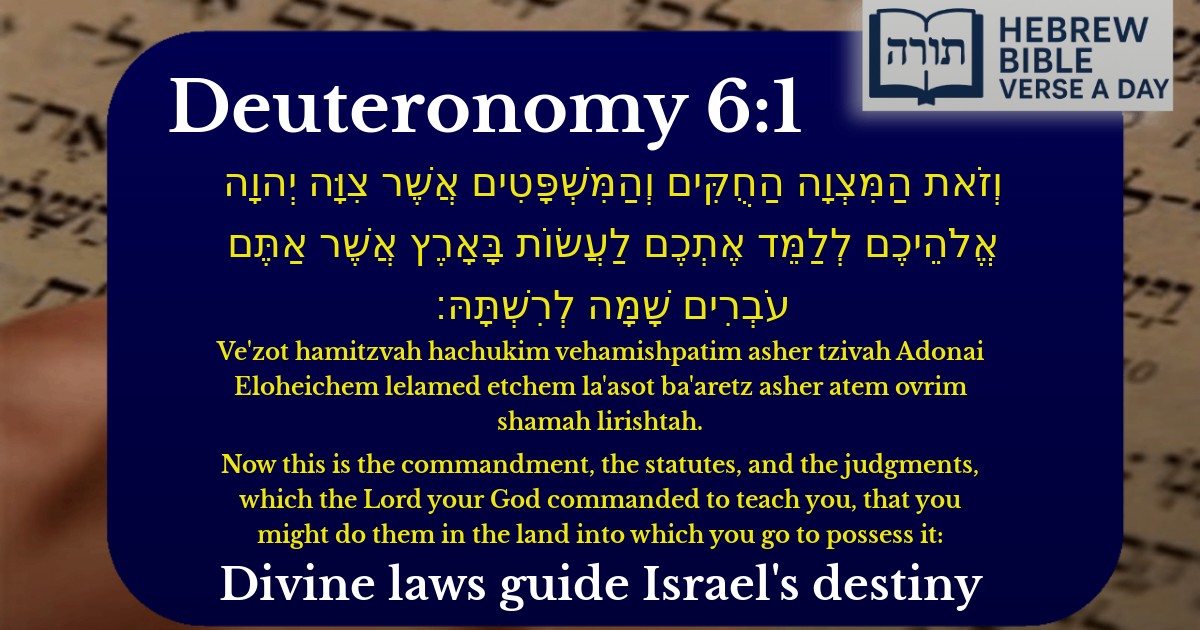Join Our Newsletter To Be Informed When New Videos Are Posted
Join the thousands of fellow Studends who rely on our videos to learn how to read the bible in Hebrew for free!
Hebrew Text
וְזֹאת הַמִּצְוָה הַחֻקִּים וְהַמִּשְׁפָּטִים אֲשֶׁר צִוָּה יְהוָה אֱלֹהֵיכֶם לְלַמֵּד אֶתְכֶם לַעֲשׂוֹת בָּאָרֶץ אֲשֶׁר אַתֶּם עֹבְרִים שָׁמָּה לְרִשְׁתָּהּ׃
English Translation
Now this is the commandment, the statutes, and the judgments, which the Lord your God commanded to teach you, that you might do them in the land into which you go to possess it:
Transliteration
Ve'zot hamitzvah hachukim vehamishpatim asher tzivah Adonai Eloheichem lelamed etchem la'asot ba'aretz asher atem ovrim shamah lirishtah.
Hebrew Leining Text
וְזֹ֣את הַמִּצְוָ֗ה הַֽחֻקִּים֙ וְהַמִּשְׁפָּטִ֔ים אֲשֶׁ֥ר צִוָּ֛ה יְהֹוָ֥ה אֱלֹהֵיכֶ֖ם לְלַמֵּ֣ד אֶתְכֶ֑ם לַעֲשׂ֣וֹת בָּאָ֔רֶץ אֲשֶׁ֥ר אַתֶּ֛ם עֹבְרִ֥ים שָׁ֖מָּה לְרִשְׁתָּֽהּ׃
Parasha Commentary
📚 Talmud Citations
This verse is quoted in the Talmud.
📖 Kiddushin 29b
The verse is cited in the context of discussing the obligation of fathers to teach their children Torah, as part of the broader discussion on commandments and education.
📖 Sotah 37a
The verse is referenced in a discussion about the importance of observing commandments upon entering the Land of Israel, emphasizing the continuity of Torah observance.


Overview of the Verse
The verse (Devarim 6:1) introduces the foundational commandments, statutes, and judgments that Hashem commanded Moshe to teach Bnei Yisrael as they prepared to enter Eretz Yisrael. This serves as a preamble to the Shema and the broader discussion of mitzvot in Sefer Devarim.
Key Terms and Their Meanings
The Purpose of the Mitzvot in Eretz Yisrael
The verse emphasizes that these laws are to be observed specifically in the land they are about to possess. The Kli Yakar explains that the mitzvot are deeply connected to the land - many commandments (like terumot, ma'aserot, and shemitah) can only be fulfilled in Eretz Yisrael. Even those mitzvot not dependent on the land take on greater spiritual significance when performed there.
The Educational Imperative
The phrase "לְלַמֵּד אֶתְכֶם" (to teach you) underscores the Torah's emphasis on education. The Rambam (Hilchot Talmud Torah 1:3) derives from here the obligation for each person to teach their children Torah. The Sifrei adds that this teaching must be thorough enough to enable proper observance ("לַעֲשׂוֹת" - that you might do them).
Historical Context
Rabbi Samson Raphael Hirsch notes that this verse comes as Bnei Yisrael stand ready to enter the land after 40 years in the wilderness. The repetition of mitzvot here prepares them for the transition from miraculous existence in the desert to natural life in their own land, where they must actively implement Torah law.